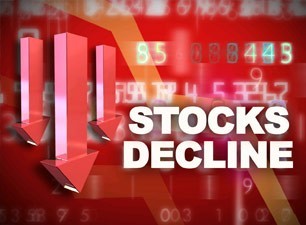NEW YORK - The Dow Jones industrial average dropped nearly 240 points in morning trading Wednesday after Italy's borrowing costs soared, a sign that Europe's debt crisis had spilled into the third-largest economy in the euro bloc.
The yield on the benchmark Italian government bond spiked above 7 percent, a sign that investors are losing faith in the country's ability to repay its debt. Greece, Portugal and Ireland required bailouts when their bond yields rose above 7 percent. Unlike those countries, Italy's $2.6 trillion in debt load is too large for other European nations to rescue.
Italian Premier Silvio Berlusconi promised Tuesday to step aside after a new budget is passed, but there are concerns that the transition to a new government will be difficult. Markets see Berlusconi as an impediment to the kind of far-reaching economic reforms Italy needs to remain solvent.
"The market loves a quick solution and we're obviously not getting one," said Mark Lehmann, director of equities of JMP Securities. "We've had a strong rally off the bottom any piece of bad news is going to be responded to negatively."
Europe's debt drama also continued to play out in Greece. The two main political parties in that country are still engaged in power-sharing negotiations and have yet to name a prime minister to lead an interim government. The new government must pass an austerity package to receive the next loan installment of emergency loans. Without the funds, Greece could default before Christmas.
The Dow dropped 235 points, or 2 percent, to 11,930 as of 11:10 a.m. Eastern. It had been down as many as 317 points in the first hour of trading.
It was the largest drop for the Dow since a two-day slide beginning Oct. 31. The Dow fell 276 on Monday of last week and then 297 points the following day after the Greek prime minister said he would put an unpopular package of austerity cuts to a public vote. That raised the prospect that the measures would fail and Greece would default. The referendum was later scrapped.
The S&P 500 lost 28, or 2.3 percent, to 1,246. The S&P is now negative for the year again. The index has alternated between small gains and losses for 2011 since Oct. 26.
The Nasdaq composite slid 67, or 2.5 percent, to 2,659.
The slide was extraordinarily broad. Only six stocks in the S&P 500 index rose. Energy and financial companies fell the most. JPMorgan Chase & Co. fell 4.3 percent and Chevron Inc. fell 3 percent.
Markets fear that a chaotic default by either Greece or Italy would lead to huge losses for European banks. That, in turn, could cause a global lending freeze that might escalate into another credit crisis similar to the one in 2008 after Lehman Brothers fell.
Some analysts fear that the euro itself could fall, which would lead to inflation and a breakdown in free trade agreements in the European Union. Together, the countries in the European Union represent the world's largest economy.
European markets also fell sharply. Italy's benchmark index plunged 4.7 percent. Germany's DAX fell 2.3 percent; France's CAC-40 lost 2.4 percent.
The prices of assets seen as safe havens rose sharply. The dollar rose 1.8 percent against the euro. The yield on the benchmark 10-year Treasury note fell to 1.95 percent from 2.08 percent late Tuesday, a steep drop.
In corporate news, General Motors Co. lost 8.7djii
percent after the company said Europe's economic woes were weighing on its profits.
The Wendy's Co. dropped 4.2 percent after the company said higher beef prices contributed to a larger third-quarter loss.
Dean Foods fell 5.8 percent after the company took a write-down in its fresh dairy business.
Saturday
July 12th, 2025
8:07PM









